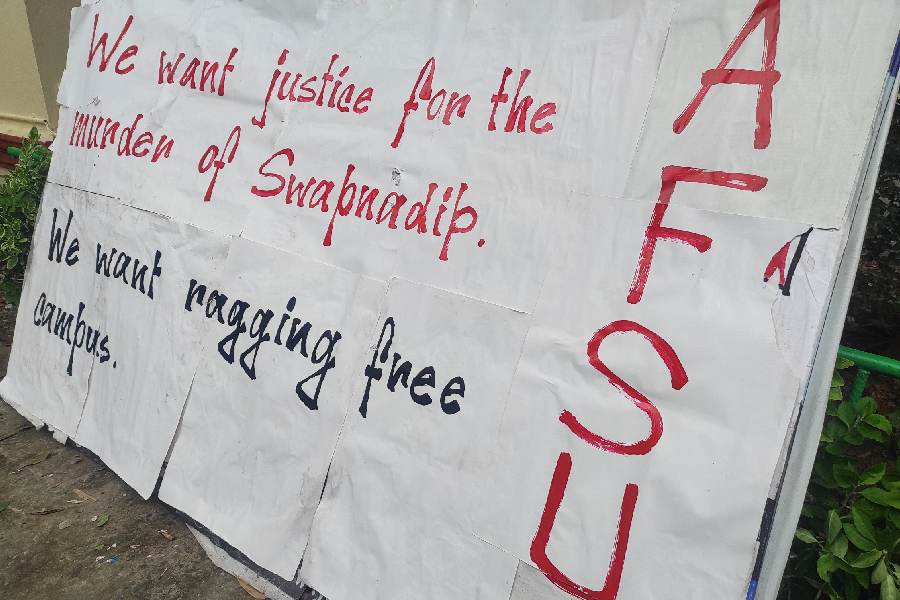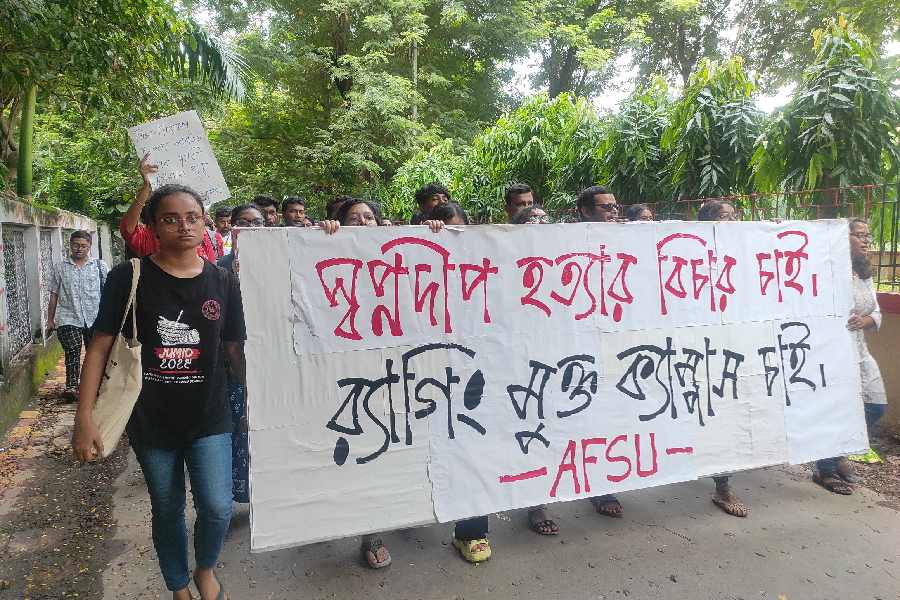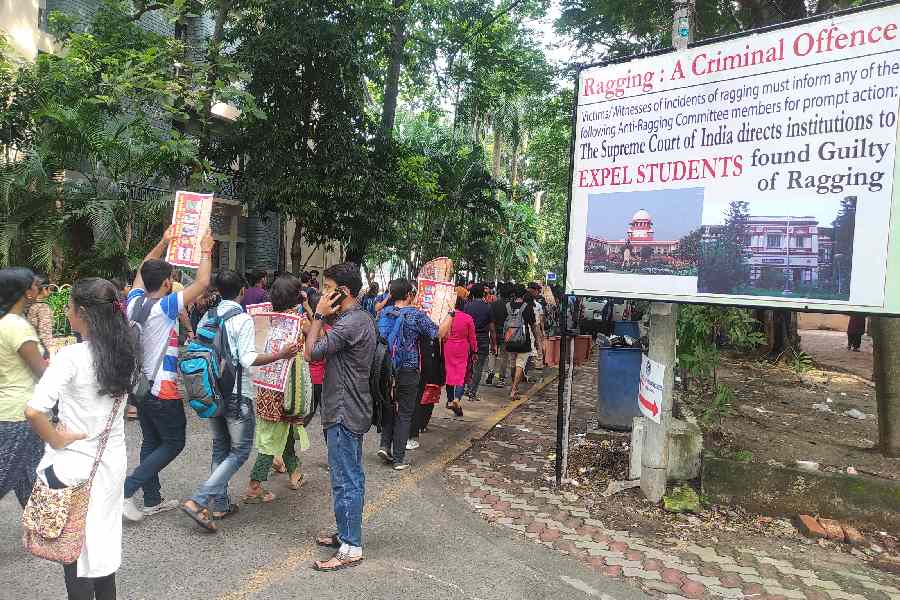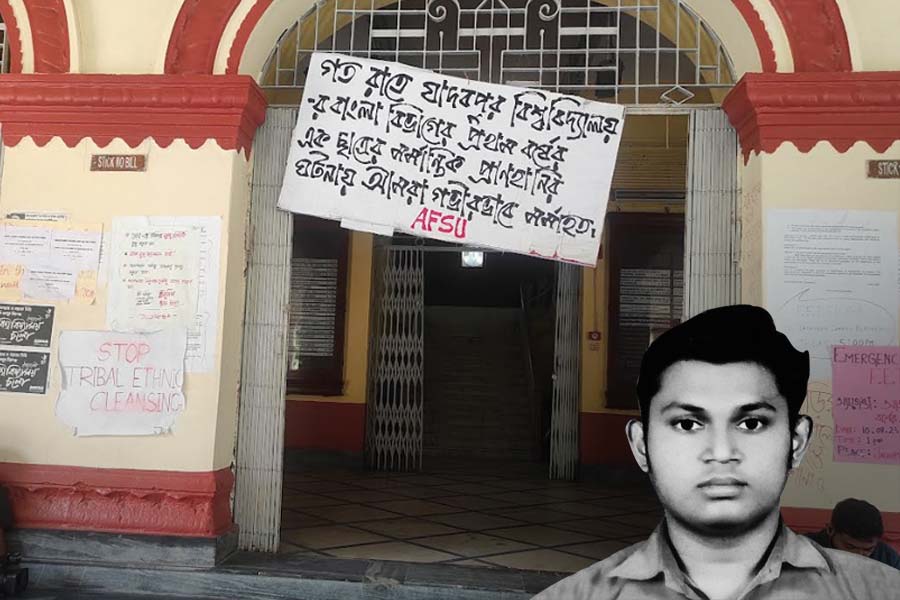The ignominy of being thrown out of his own room, lock stock and barrel, at the Jadavpur University main hostel on a certain midnight before the onset of winter in 2021 continues to haunt Subhajit Ghosh, a post graduate final year student in Bangla. More than the menial jobs he was forced to perform for his seniors in the hostel -- which included fetching food and alcohol at odd hours or else face physical assault -- what was worst for Subhajit was that the torture and threats happened with full knowledge of university authorities who did little to protect him from the onslaught when it was most needed.
“My torture began from the time I stepped into my hostel room back in 2019 when I had joined the department as a fresher. The tasks ranged from fulfilling ‘orders’ of seniors and former students which more often than not stripped me of all self-respect to forceful sleep deprivation and disturbance in studies. One night, they simply kicked me out of my room. Following my repeated complaints before the Dean of Students, both verbal and written, hostel authorities shifted me to a guest room instead of bringing the perpetrators to task,” Subhajit recounted.
He continued: “When the hostel reopened post-pandemic lockdown, I was threatened in front of hostel authorities for filing complaints. Those who threatened me were a new set of seniors because the previous group had left by then. I realized, I will never be safe in this place no matter who led the ragging menace. For the next six months or so, I shifted between mess accommodations provided to me by some seniors who empathized with my plight. Sometime during the last quarter of 2022, authorities shifted me to the in-campus boys hostel which finally ended my trauma.”
Subhajit's unpleasant memories were triggered in the context of Swapnadip Mondal whose quiet life was tragically cut short by a violent death on the wee hours of Thursday as a suspected fallout of the persisting criminal culture of ragging even as piercing "hallabol" slogans from protesting students shattered the air on Jadavpur University's main campus a day later.

An AFSU poster in JU main campus calls Swapnadip's death a "murder"
Not as fortunate
Swapnadip, though, wasn’t as lucky as his senior in the same department to survive through the ordeal since the freshman’s body lay on the hostel driveway in a pool of blood without a shred of clothing on him, purportedly because he jumped from the third floor corridor of the A2 block, after having attended classes for just two days.
Ironically, anti-ragging billboards have been placed throughout the campus warning violators of dire consequences. The ineffectiveness of the campaign was magnified further by the rally held by protesting students who barely lifted their eyes to acknowledge the presence of these billboards while walking past them.
Adding to the distress in this sordid saga of continued masochistic power-play at work inside one of the premier learning institutes of Bengal is the fact that victims at the receiving end of the torture are mostly from economically underprivileged backgrounds. The total monthly cost of hostel accommodation for students at JU is a paltry Rs 25 for bed and electricity. The mess facility is an additional cost which students have to bear and differ from hostel to hostel.

AFSU students take out a protest rally in JU main campus on Friday demanding end to ragging menace
High demand for hostels
“Most students from far flung areas of the state aren’t able to afford living as paying guests which would cost them at least Rs 5,000 a month over and above transport costs. That’s why there’s always a high demand for hostel cots and perhaps also the reason why students choose to stay mum even in the face of ragging and torture,” a teacher said.
That opinion seemed to find resonance in a social media post by a UG III student published as a rebound to his fellow student’s death. The student related his angst of facing dehumanizing trauma, all in the name of ‘Intro’ – apparently an abbreviation for introduction ritual for newcomers – which forced him to quit the hostel and stay as a paying guest at Kasba, some 5km from the campus. His "tasks" included regular stripping before seniors and shaving heads down to “military cuts”, he said.
“Ragging is the practice of sadistic pleasure passed off in the name of tradition,” he stated in his post, adding, “Those with limited economic means from the countryside are left with two choices: relocate or die. That’s why I call this death an institutional murder.”
'Authorities are always lax'
“I know of students who passed out of this university two decades ago and still continue to live in the hostel,” alleged Tamalina Ghosh, a PG II student while asserting that Mondal’s death isn’t a one-off incident at the campus, rather a general and continuing trend which received encouragement from the authorities’ slackness in creating necessary separate infrastructure for fresh students who are left at the mercy of a section of sadistic seniors.
“Hundreds of students have undergone the same trauma as Swapnadip in the past. Couldn’t the university build a separate hostel for first year undergrads inside the campus all these years? Couldn’t they make a list of outsiders who continue to occupy hostels in unauthorized manner and remove them? Are the hostel wardens and superintendents powerful enough to act against the perpetrators when they receive complaints?” were some of the questions Tamalina had for the authorities.
Shaken from the alleged slumber, the university has now ordered a temporary shift of first year students from the main hostel to the in-campus new boys’ hostel while directing that outsiders and former students should immediately vacate the premises. The too-little-too-late barb continues to get thrown at the authorities, though.

Participants in protest rally walk past one of the anti ragging billboards in JU main campus
Murder investigation
The police, on its part, has started a murder investigation into the incident based on a complaint lodged by Ramprasad Kundu, the deceased’s father, and has reportedly detained three senior students of the varsity, including Sourav Chowdhury – a 2022 MSc passout -- while continuing to question other suspects. Taking suo motu cognizance of Mondal’s unnatural death, the state human rights commission has also thrown its hat in the ring and has sought a report from varsity authorities.
“Ragging is a mindset,” said Prof Tushar Josh, member of both the university’s anti-ragging committee which deals with complaints and the anti-ragging squad which is supposed to intervene and protect victims when such incidents come to light. “It’s even promoted by our social rituals like during a wedding ceremony where the apparently sounding leg-pulling of the groom by the ladies of the house often breach the threshold of dignity,” he added.
Josh stated that in his 38-year association with the university, he never came across such a severe consequence of ragging. “We get a few complaints every year and we deal with them. Suspensions and even rustications have happened in the past. But that’s where our penal authority ends,” he declared.
Allocation of hostel rooms
Umayer Ahmed, a Geology student aspiring for PhD, questions the process of allocation of hostel rooms. “There is an underlying issue of deep-seated nepotism in selection of candidates’ eligibility for hostel spaces. In majority of cases candidates close to ‘dadas’ in mess committees are the ones who get allocations while more deserving candidates get left out. Those who get allocations in a fair manner are usually the ones targeted for ragging,” he stated.
“We brought this to the attention of the authorities many times before but those have fallen on deaf ears. This death could have been prevented if the authorities had listened to us. We demand an overhaul in the hostel allocation system and the process should be made transparent,” he said while participating in a protest near the dean of students' office.
Rajat Roy, Dean of Students and an important constituent of the anti-ragging committee, said: “These are policy matters which are decided by the executive council or the vice chancellor. I have no say in this. My job is to implement the policy decisions made at the highest level.”










